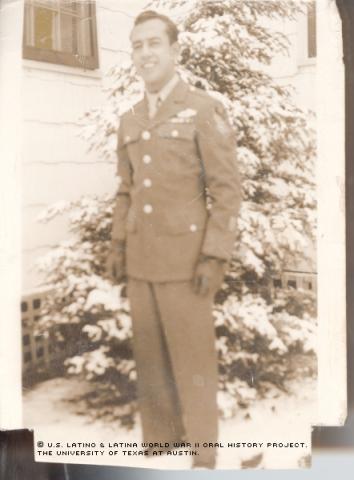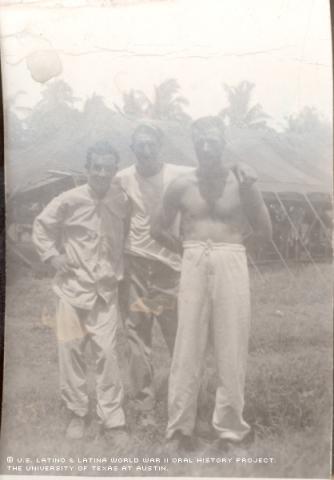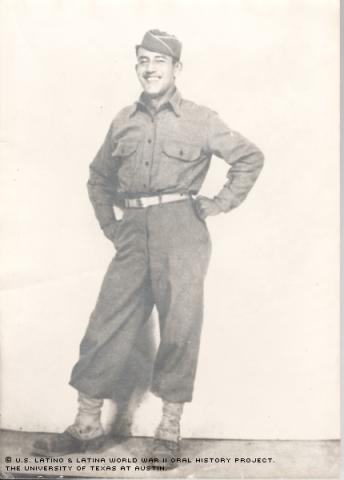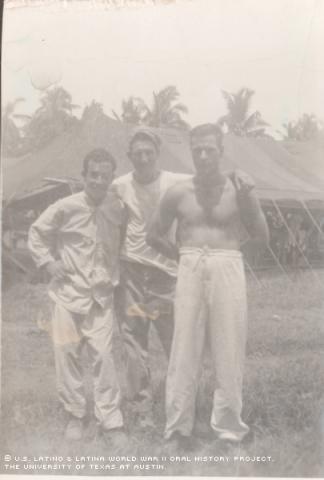



By Veronica Franco
On his 20th birthday, Delphino Peña was drafted into World War II as a soldier fighting for both his country and his life in the Philippines against the Japanese.
After capturing Leyte and Samoa through intense hand-to-hand combat all over the Pacific, Peña’s unit went to Luzon and awaited orders from Gen. Douglas MacArthur. MacArthur's orders were to enter Manila and liberate more than 3,700 Allied prisoners of war. These prisoners were being held at Santo Tomas University behind a wall that was 24 inches thick and guarded heavily by Japanese troops. In order to give the prisoner's hope, a pilot flew over the camp in advance and secretly dropped a note into the camp to let them know help was on its way. The note read, "Roll out the barrel, Santa Claus is coming to town; Monday or Tuesday."
"But we got in there on Saturday and surprised everybody!" Peña said.
The unit met heavy resistance from the Japanese, but Army tanks plowed through the wall surrounding the university, and the soldiers were able to run in alongside the tanks and liberate the prisoners being held on the first floor of the school.
"Oh, you should have seen the prisoners; they came out hollering, singing and praying. ... It was just mixed emotions, because they knew the day had come for them to be liberated," Peña said. "There were over 3,000 prisoners all together. ... In this group, there were eight Americans -- who were nurses -- that had been captured during the time of the fall of Bataan and kept prisoner for over six months. Four of them were so sick and weak they could not make it out. But the other four, we talked to them, and they cried when they tried to talk to us and showed us a pole crossed over another where they had been tied by the tips of their thumbs and made to stand on the tips of their toes as torture."
After liberating the prison camp, Peña and his fellow troop members rounded up the Japanese in lines so they could be escorted out of the city and to the front lines. "That was something," Peña recalled, "because there were only 75 of us to a line of hundreds of them. ... Our Colonel Brady went and spoke to their Lt. Colonel Hayashi -- I'll never forget that name -- and we marched them out."
It’s during this time that an incident occurred between Peña and one of the Japanese soldiers. As Peña walked beside the line of Japanese prisoners, one of them swiftly elbowed him.
"Well, I just elbowed back a good two times, and he didn't do anything like that anymore," Peña recalled.
Afterward, the platoon sergeant ordered Peña and a friend named Leo to be rear guard as they returned to San Tomas University.
When they got back, the troops had the opportunity to go into the Japanese quarters, where an abundance of food and valuables such as gold were being kept. They gave food to the prisoners, and many men, including Peña, were given the privilege of taking gold pieces. However, he gave it all away to fellow soldiers because he was still going to be on the front lines. "I felt that if I was going to be on the front lines, I had no use for this gold. ... I didn't think I was coming back," Peña said.
Peña did come back. He was on Leyte Island when the atomic bomb was dropped on Hiroshima in Japan; this was a relief to him because, like many of his generation, he said he feels it saved the lives of many more men from becoming casualties of war. The probability of Peña being on the front lines once more, in order to make an infantry attack on Japan, would have been inevitable had the atomic bomb not been used.
Peña was still in the Philippines when he heard the war had ended. He came home to the United States by hospital ship, as he had malaria and jaundice and was placed in several hospitals for treatment until he recovered. Peña received the Bronze Star with a Liberation Ribbon for being one of the Philippine liberators, an Infantry Combat Badge, a Pacific Campaign Medal with eight battle stars and the medal he was happiest to receive, his Discharge Button.
Three years after the war ended, Peña and his wife, Matilda Garcia Peña, were married. They have two children: Vivian Ann Peña and Noe Orlando Peña. The Peñas now reside in Houston, where Peña volunteers as an honorary pall bearer at military funerals.
Mr. Peña was interviewed in Houston, Texas, on August 16, 2001, by Domingo Marquez and Paul Zepeda.

